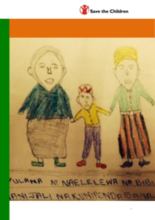Save the Children extended Kinship Care research begun in West Central Africa in 2012 across East Africa in 2014, and this paper presents the findings for Zanzibar. The investigation was primarily qualitative and participatory focused, and promoted the active involvement of children and caregivers as field researchers. A total of 51 caregivers, 67 children and 19 stakeholders took part in the research over a period of seven months in collaboration with the Revolutionary Government of Zanzibar and SOS Villages Tanzania.
The paper begins with an introduction to the rationale for the research before describing the methodology employed before moving to outline the key findings which have been divided into 5 main themes:
- Existing legal and policy frameworks, available data and national government programmes concerning kinship care;
- Traditional practices, trends in kinship care and influencing factors;
- Positive and negative experiences of kinship care;
- Children and caregivers support needs, and the availability of support;
- Policy and practice recommendations.
The paper concludes with a summary and recommendations for moving forward.
It is our hope that in better understanding the complex systems of kinship care, we can develop suitable and effective programs to support children without appropriate care in Zanzibar in much the same way that is being undertaken in West Central Africa.

